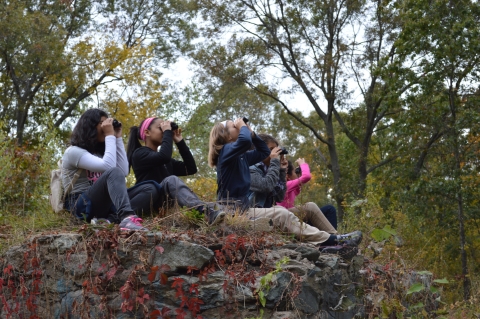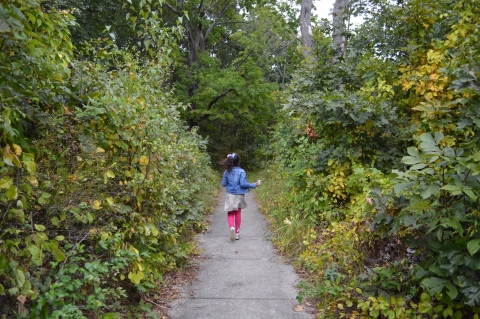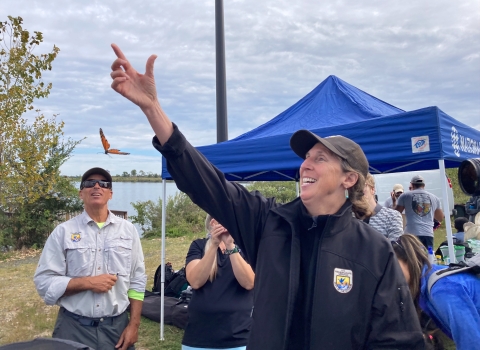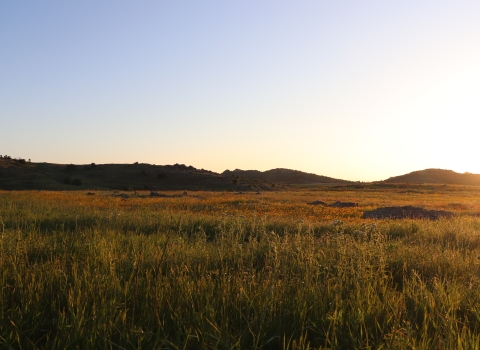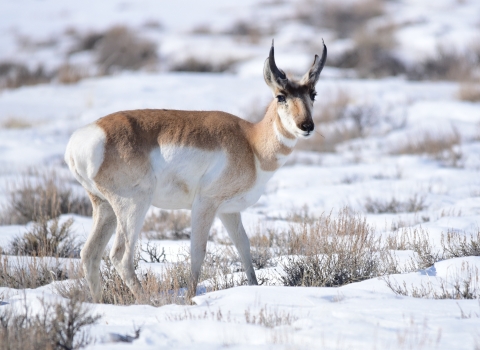When I met April Alix, conservation program coordinator for the Providence Urban Wildlife Conservation Partnership, she shared a motto regarding her work that stuck with me: “Sense of wonder, not worry.”
Sense of wonder with nature, that is — sunlight filtering through a breezy tree, the cheerful lilt of morning birdsongs, the satisfaction of catching a first fish. Not worry — about insects, or getting your feet muddy or trying out a new activity. That’s the goal of the Urban Partnership: to build connection, comfort and confidence in the outdoors, one experience at a time.
In February 2024, partners gathered at the Roger Williams Park Botanical Center to celebrate the 10-year anniversary of the Providence Urban Wildlife Conservation Partnership. Since 2013, the U.S. Fish and Wildlife Service has worked with a diverse group of community organizations to inspire Providence residents with the nature in their neighborhoods. A lot can change in a decade, but the motto remains the same. Sense of wonder, not worry.
Nature in the neighborhood
The Providence Urban Wildlife Conservation Partnership was established in 2013 by the U.S. Fish and Wildlife Service, Providence Parks Department and the Partnership for Providence Parks. It was one of the first eight urban partnerships the Service launched in cities in the U.S. to expand conservation beyond lands we manage. There are now 32 urban partnerships in cities across the country.
The Service is most well-known for its national wildlife refuges, and there are five in Rhode Island (they’re fantastic, by the way). But for many people living in Providence, making the trek to these remote areas isn’t feasible.
Fortunately, Providence is blessed with parks and greenspaces — more than 120 of them. Every Providence school is within a half-mile of one of these places, and most residents can find a park or greenspace within a 10-minute walk.
Collaboratively, the partnership uses this robust nature network to engage underserved communities in stewardship projects, environmental education and recreation activities.
“From the beginning, addressing the barriers that prevent people from connecting with nature has been a top priority for the partnership,” said Janis Nepshinsky, Visitor Services Manager for the Rhode Island National Wildlife Refuge Complex “Using Providence’s parks and green spaces as a base is how we help ensure everyone can participate and feels welcome.”
They also address financial and cultural barriers by making all events free and hiring Spanish-speaking staff to provide bilingual outdoor programming.
The heart of the community
The Providence Urban Wildlife Conservation Partnership has grown from three to more than 30 community partners — all dedicated to bringing people together to enjoy nature on their own terms, in safe and familiar spaces. These groups bring a diversity of backgrounds, skills and experiences to the table, and most importantly, they’re deeply rooted in the city. This ensures programming is truly collaborative, meaningful and relevant to the community’s wants and needs.
In a snapshot, we’ve worked with partners in Providence to:
• Provide year-round environmental education programs at schools, parks, recreation centers and national wildlife refuges
• Plant and maintain urban wildlife habitats and schoolyard habitats
• Host an annual Indigenous Youth STEM camp, with a focus on co-stewardship
• Offer free community fishing events throughout the state to expand fishing access to the Greater Providence community
• Track migratory species through citizen-science projects
At the celebration event, Cynthia Martinez, chief of the National Wildlife Refuge System, lauded the partnership as a national leader in urban conservation.
“The Providence Urban Wildlife Conservation Partnership is looked to as an example for others, we are working toward healthy, clean environments where wildlife and people thrive. Congratulations to all the amazing partners, and the people of Providence. It is incredible to see this vision becoming a reality,” said Martinez.
Fostering future stewards
Following speaker remarks, Alix invited students from the Paul Cuffee School — another community partner — to share their favorite experiences in nature. In a room full of organizational leaders and government officials, these fifth graders were fearless, and their answers were wholesome. One student loved exploring city parks during guided bird walks; another enjoyed collecting bugs and learning to identify them.
It was a powerful moment and important reminder of the lasting impact time spent in nature has, especially on youth.
“Ultimately, we want communities here to feel a sense of ownership and responsibility for these outdoors spaces,” said Alix. “We want kids in Providence to see themselves as stewards of their environment. It’s easier to make those connections when they appreciate the nature right in their neighborhood.”
Wherever the Providence Urban Wildlife Conservation Partnership goes next, it will certainly be thanks to the passion of innumerable staff, partners, volunteers, teachers and the people of Providence.
“It’s the partners that have made these past 10 years so impactful,” said Nepshinsky. “They connect us to the heart of Providence. We’re so fortunate it turned out this way.”
For more information on the U.S. Fish and Wildlife Service’s work toward building long-term, meaningful relationships with urban communities through conservation, visit https://www.fws.gov/program/urban-wildlife-conservation.
To learn more about the Providence Urban Wildlife Conservation Partnership and Urban Bird Treaty city, visit https://www.fws.gov/refuge/ninigret/initiatives


